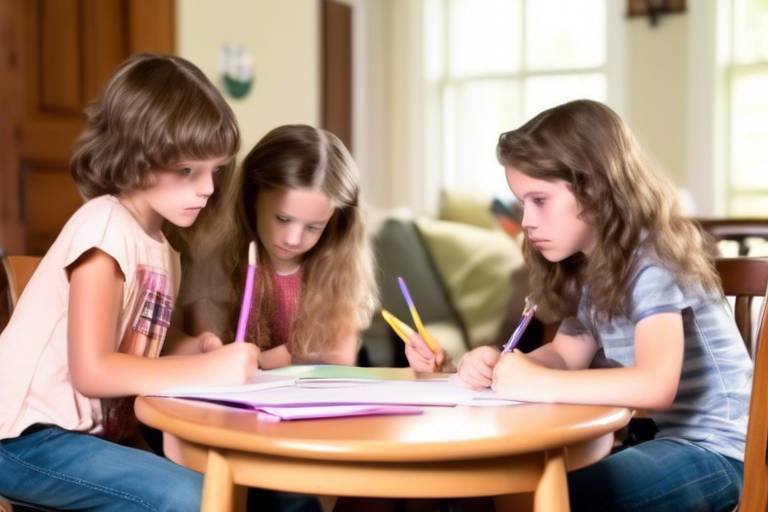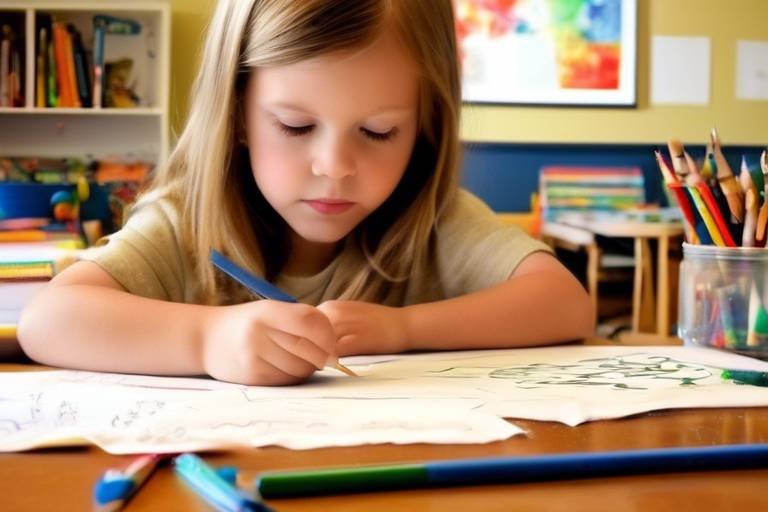Facing the Challenges of Homeschool Socialization
Homeschooling is a journey filled with endless possibilities, but it also comes with its own set of challenges, particularly when it comes to socialization. Many parents worry about whether their children will develop the necessary social skills that are typically nurtured in a traditional school environment. It's a valid concern—after all, social interaction plays a crucial role in a child's emotional and psychological development. But here’s the good news: with a little creativity and intentionality, homeschooling families can create vibrant social experiences for their children that rival those found in conventional schools.
Think about it: when you’re in a traditional school setting, socialization happens almost automatically. Kids are grouped together by age, and they have built-in opportunities to interact during lunch, recess, and group projects. But in a homeschool setting, parents must be proactive in seeking out social opportunities. This doesn’t mean that homeschooled children are destined for isolation; rather, it opens up a world of diverse interactions that can be tailored to each child’s interests and needs.
One of the most important aspects of fostering socialization in homeschooled children is understanding the various avenues available for them to connect with others. These can include community programs, co-op groups, and even online communities. By tapping into these resources, parents can help their children cultivate friendships and develop essential social skills in a variety of contexts. For instance, participating in sports teams or art classes not only enhances a child's skill set but also provides a platform for making friends.
Moreover, the flexibility of homeschooling allows for unique social experiences that traditional schooling might not offer. Imagine taking a field trip to a museum with a group of other homeschoolers, where kids can bond over shared interests and experiences. Or consider the benefits of organizing playdates where children can engage in imaginative play, learning to navigate friendships in a relaxed atmosphere. These opportunities can be incredibly enriching and help dispel the myth that homeschooled children are socially inept or isolated.
As we delve deeper into this topic, it’s essential to address common misconceptions and provide practical strategies that can help homeschooling families overcome socialization challenges. With the right approach, homeschooled children can thrive socially, developing meaningful relationships and a strong sense of community. So, let’s explore how to make socialization a vibrant part of the homeschooling experience!
Understanding why socialization is crucial for children's development helps parents recognize the need for intentional efforts in creating social opportunities for their homeschooled children.
Many misconceptions surround homeschooling, particularly regarding socialization. This section addresses these myths and highlights the realities of social interactions for homeschooled children.
This myth suggests that homeschooled children lack social interactions. We will discuss how homeschooling can actually provide diverse social opportunities through various activities and community involvement.
Engaging in community programs such as sports, arts, and volunteer work can help homeschooled children develop social skills while connecting with peers outside their home environment.
Homeschool co-ops and classes offer structured opportunities for socialization. This section will explore how these groups facilitate friendships and collaborative learning experiences among homeschooled children.
This common belief overlooks alternative avenues for socialization. We will discuss various environments where homeschooled children can interact and develop social skills effectively.
This section provides practical strategies that homeschooling families can implement to ensure their children have ample opportunities for social interaction and relationship building.
Organizing playdates and social events can foster friendships among homeschooled children. This approach encourages peer interactions in a relaxed and enjoyable setting.
Online platforms offer a unique way for homeschooled children to connect with peers. We will explore how virtual interactions can complement traditional socialization methods, providing additional support and friendship opportunities.
Q: Do homeschooled children have fewer opportunities for socialization?
A: Not at all! While it may require more effort to seek out social opportunities, homeschooled children can engage in a variety of activities, including sports, arts, and community service, to build social connections.
Q: How can I ensure my homeschooled child is socializing enough?
A: Consider joining homeschool co-ops, participating in community events, and organizing regular playdates to create a consistent social environment for your child.
Q: Are online interactions effective for socialization?
A: Yes! Online communities can provide valuable social experiences, allowing homeschooled children to connect with peers who share similar interests, especially if in-person opportunities are limited.

The Importance of Socialization in Childhood
Socialization is not just a fancy word thrown around in parenting circles; it’s a fundamental part of childhood development that shapes who we become as adults. Imagine a world where children grow up without interacting with their peers—sounds a bit like a sci-fi movie, doesn’t it? But in reality, socialization is the process through which children learn to communicate, share, and build relationships. It’s about more than just making friends; it’s about understanding the nuances of human interaction, empathy, and emotional intelligence.
Think about it: when kids play together, they’re not just having fun; they’re learning essential life skills. From negotiating the rules of a game to resolving conflicts, these interactions are crucial for their social development. In fact, studies show that children who engage in regular social activities tend to have better emotional health and are more adept at handling life’s challenges. So, how do we ensure that homeschooled children get these vital experiences?
Creating opportunities for socialization is key. Parents need to recognize that while traditional schooling offers a structured social environment, there are plenty of other avenues to explore. It’s not about the number of friends a child has but the quality of those interactions. Here are some reasons why socialization is so important:
- Emotional Development: Children learn to express their feelings and understand others' emotions.
- Communication Skills: Regular interaction helps kids develop strong verbal and non-verbal communication abilities.
- Conflict Resolution: Social settings provide a platform for children to learn how to resolve disagreements peacefully.
- Building Confidence: Engaging with peers boosts self-esteem and helps children feel more secure in social situations.
In essence, socialization is the glue that holds our communities together. It fosters a sense of belonging and helps children develop their identity. For homeschooled children, it’s crucial to seek out varied social experiences that can fill the gaps left by traditional schooling. Whether it’s through community programs, sports, or co-op classes, the goal is to provide a rich tapestry of social interactions that can support their growth and development.
By understanding the importance of socialization, homeschooling families can take proactive steps to ensure their children are not only educated but also socially adept. This intentional approach can turn the challenges of homeschooling into a unique opportunity for rich, diverse social experiences that will benefit children for a lifetime.

Common Misconceptions about Homeschooling
When it comes to homeschooling, there are a plethora of misconceptions that often cloud the judgment of parents and the public alike. One of the most prevalent beliefs is that homeschooled children are isolated and lack the social skills necessary for thriving in society. However, this notion couldn't be further from the truth. In fact, many homeschooled children engage in a variety of social activities that not only enrich their lives but also enhance their social abilities.
Another common myth is that socialization only occurs within the four walls of a traditional school. This belief overlooks the numerous environments where children can interact and learn from one another. From community sports teams to arts and crafts classes, there are countless opportunities for homeschooled children to develop strong social skills. In reality, the world is a vast classroom, and homeschooled children often find themselves exploring it in unique and fulfilling ways.
To help clarify these misconceptions, let's delve deeper into some of the most frequent myths surrounding homeschooling:
- Myth 1: Homeschooled children are socially awkward.
- Myth 2: Homeschooling limits children's opportunities to make friends.
- Myth 3: Only children who attend traditional schools can learn teamwork and collaboration.
Each of these myths can be debunked with real-life examples and statistics. For instance, many homeschooling families actively participate in local community events, sports leagues, and educational co-ops, creating a rich tapestry of social interactions that rivals those found in traditional schools. It's essential to recognize that socialization is not limited to the classroom; it occurs in parks, community centers, and even online.
Moreover, the flexibility of homeschooling allows parents to tailor social experiences to their child's unique needs and interests. This personal touch can lead to deeper connections and friendships that may not be as readily available in a conventional school setting. So, rather than viewing homeschooling as a barrier to socialization, it’s more accurate to consider it a different pathway that can lead to vibrant social lives.
In conclusion, dispelling these misconceptions is vital for understanding the true nature of homeschooling. By fostering an environment that encourages social interactions, parents can ensure their homeschooled children thrive socially, emotionally, and academically. It's all about embracing the journey and recognizing that socialization can take many forms.

Myth: Homeschooled Children Are Isolated
One of the most pervasive myths surrounding homeschooling is the idea that homeschooled children are isolated and lack social interactions. This misconception can stem from the traditional view of schooling, where children are surrounded by peers for several hours a day. However, the reality of homeschooling is quite different. In fact, many homeschooled children engage in a variety of social activities that not only enhance their social skills but also foster meaningful friendships.
Think about it this way: while traditional school settings may provide opportunities for socialization, they often come with limitations. Homeschooling, on the other hand, opens the door to a world of diverse interactions. Homeschooled children can participate in community sports teams, art classes, and various extracurricular activities, allowing them to meet peers from different backgrounds and interests. This broadens their social circles far beyond what a single classroom can offer.
Moreover, homeschooling families often seek out community programs and events designed specifically for children. These activities can range from local science fairs to group field trips, where homeschooled children can collaborate and learn alongside their peers. The beauty of homeschooling lies in its flexibility, allowing parents to tailor their children's social experiences to suit their unique needs.
To illustrate this point further, consider the following table showcasing various social opportunities available to homeschooled children:
| Activity | Description | Social Benefits |
|---|---|---|
| Sports Teams | Participation in local leagues or clubs | Teamwork, communication, and friendship |
| Art Classes | Group classes focused on creative expression | Collaboration and shared interests |
| Community Service | Volunteering for local charities | Empathy, teamwork, and social responsibility |
| Field Trips | Organized visits to museums, parks, etc. | Learning together and forming bonds |
It's crucial to recognize that homeschooled children are not confined to their homes, but rather they are actively engaged in their communities. They have the opportunity to form friendships that are often deeper and more meaningful, as these relationships are built on shared activities and interests rather than mere proximity. In essence, homeschooling can provide a rich tapestry of social experiences that challenge the notion of isolation.
In conclusion, the myth that homeschooled children are isolated is not only misleading but also overlooks the vast array of social opportunities available to them. By actively participating in their communities and engaging with peers through various activities, homeschooled children can develop the social skills necessary for navigating the world around them. So, the next time someone suggests that homeschooling leads to isolation, remember that it's not about where children learn, but how they connect with others that truly matters.

Community Programs and Activities
When it comes to fostering socialization among homeschooled children, play a pivotal role. These programs are not just a means of learning; they are vibrant hubs where children can interact, collaborate, and form lasting friendships. Think of these activities as the social playgrounds of the homeschooling world, where kids can explore their interests while developing essential social skills.
From sports teams to art classes, the variety of programs available can cater to different interests and age groups. For instance, local community centers often offer a range of activities, including:
- Sports Leagues: Joining a soccer or basketball team can help children learn teamwork and communication skills.
- Arts and Crafts Workshops: These allow kids to express their creativity while working alongside peers.
- Volunteer Opportunities: Engaging in community service fosters empathy and social responsibility.
Participating in these programs not only provides homeschooled children with the chance to meet others but also helps them develop a sense of belonging within their community. Imagine a child who loves painting joining an art class; they not only learn new techniques but also connect with other budding artists, sharing ideas and inspirations. This is the essence of socialization—building connections through shared experiences.
Moreover, community programs often encourage parents to get involved, creating a network of support and friendship for families. When parents participate, they model social interaction for their children, showing them the importance of community engagement. This involvement can lead to lifelong friendships among families, further enriching the social landscape for homeschooled kids.
In addition, many communities host seasonal events, such as fairs or festivals, which can be fantastic opportunities for homeschooled children to mingle with their peers. These gatherings often include fun activities, games, and performances that promote a sense of community spirit. By participating in these events, children learn to navigate social dynamics in a lively and engaging environment.
In summary, community programs and activities are invaluable for homeschooled children. They provide essential avenues for social interaction, helping kids build friendships, develop skills, and foster a sense of belonging. By actively seeking out these opportunities, homeschooling families can ensure that their children are not only academically prepared but also socially well-rounded.
Q1: How can I find community programs for my homeschooled child?
A1: Start by checking your local community center, library, or online platforms that list events and activities in your area. Social media groups for homeschooling families can also provide valuable recommendations.
Q2: Are there specific programs designed for homeschooled children?
A2: Yes, many communities offer programs specifically tailored for homeschooled children, including co-op classes and extracurricular activities that focus on socialization and collaborative learning.
Q3: How can I encourage my child to participate in community activities?
A3: Talk to your child about the benefits of meeting new friends and trying new things. Start with activities that align with their interests to make participation more appealing.
Q4: Can online communities replace in-person socialization?
A4: While online communities can provide valuable connections, they should complement, not replace, in-person interactions. A balanced approach ensures children develop a range of social skills.

Co-op Groups and Classes
Joining homeschool co-op groups and classes can be a game-changer for families looking to enhance their children's socialization skills. These groups are not just about academics; they create a vibrant community where children can interact, learn, and grow together. Imagine a bustling classroom filled with laughter, discussions, and collaborative projects—this is what co-ops aim to replicate in a homeschool setting.
Co-ops typically consist of a group of homeschooling families who come together to share resources, teaching responsibilities, and social experiences. This structure allows children to engage with peers in a structured environment, which can be incredibly beneficial for their social development. For instance, in a co-op, children might participate in activities like science experiments, art classes, or even sports, all while building friendships that can last a lifetime.
One of the most significant benefits of co-op groups is the opportunity for collaborative learning. Children can work on projects together, which not only enhances their academic skills but also teaches them valuable lessons in teamwork and communication. They learn to express their ideas, listen to others, and resolve conflicts—skills that are essential for success in any social setting.
Moreover, co-ops often organize field trips, community service projects, and social events, further enriching the learning experience. These activities allow homeschooled children to step outside their usual environment and interact with a broader community. For example, a co-op might arrange a visit to a local museum or a nature reserve, providing a fun and educational way for kids to bond and make memories.
It's also worth noting that co-ops can cater to various interests and age groups, allowing families to find a group that aligns with their philosophies and educational goals. Whether your child is interested in science, art, or literature, there’s likely a co-op that focuses on those subjects. This flexibility ensures that children are not only learning but are also engaged and excited about their education.
In summary, co-op groups and classes offer a fantastic way for homeschooled children to develop social skills while receiving a well-rounded education. By participating in these groups, children can enjoy the best of both worlds: the personalized learning experience of homeschooling combined with the social interactions found in traditional schooling. So, if you're a homeschooling parent, consider exploring local co-ops—your child’s social skills and friendships may flourish in ways you never expected!
- What is a homeschool co-op? A homeschool co-op is a group of homeschooling families that come together to share resources, teaching responsibilities, and social experiences.
- How do co-ops benefit socialization? Co-ops provide structured opportunities for children to interact with peers, engage in collaborative learning, and participate in social events.
- Are co-ops only for academic subjects? No, co-ops often include a variety of activities, including arts, sports, and community service, which promote socialization.
- Can I find a co-op that fits my child’s interests? Yes, many co-ops cater to specific interests and age groups, allowing families to find a suitable match.

Myth: Socialization Only Happens in School
Many people cling to the idea that socialization is a phenomenon that occurs exclusively within the walls of a school. This myth is not only misleading but also overlooks the rich tapestry of social experiences that homeschooled children can enjoy outside traditional educational settings. Think about it: socialization is not merely about being in a crowded room with peers; it’s about forming connections, developing communication skills, and building relationships that last a lifetime. So, where else can socialization happen?
First off, let’s consider the myriad of environments available to homeschooled children. From community sports teams to art classes, the opportunities for interaction are abundant. For instance, participating in local sports leagues can be a fantastic way for children to learn teamwork and sportsmanship while making friends. Similarly, engaging in community theater or music classes allows children to express themselves creatively while connecting with others who share similar interests.
Moreover, extracurricular activities play a pivotal role in social development. Activities such as:
- Scouting Programs: These provide a structured environment where children learn valuable life skills while forging friendships.
- Volunteer Work: Helping out at local charities or community events not only teaches empathy but also introduces children to diverse groups of people.
- Art and Craft Workshops: These creative spaces foster collaboration and communication among children, allowing them to bond over shared projects.
Additionally, many homeschooling families participate in co-op groups where parents come together to provide educational opportunities for their children. These co-ops often include social activities, field trips, and collaborative learning experiences that can significantly enhance social skills. In these settings, children have the chance to interact with peers regularly, debunking the myth that socialization is confined to school.
Furthermore, let’s not forget the power of community involvement. Many homeschooling families actively engage in local events, festivals, and workshops, creating a vibrant social calendar. This not only enriches their children’s lives but also fosters a sense of belonging and community. By stepping outside the traditional classroom, homeschooled children can experience a wider range of social interactions, developing a more robust social skill set that prepares them for real-world situations.
In essence, the belief that socialization only happens in school is a narrow viewpoint that fails to recognize the diverse avenues available for homeschooled children. With a little creativity and effort, parents can ensure that their children are not only socially adept but also well-rounded individuals ready to thrive in various social settings.
Q: How can I ensure my homeschooled child is socialized?
A: Engage them in community activities, co-ops, and extracurricular programs. Regular playdates and social events can also help build friendships.
Q: Are homeschooled children really missing out on social skills?
A: Not at all! Homeschooled children often have varied social interactions through diverse activities that can enhance their social skills just as much, if not more, than traditional schooling.
Q: What role do online communities play in socialization for homeschooled kids?
A: Online platforms can provide additional support and friendship opportunities, allowing children to connect with peers who share similar interests across wider geographical areas.

Strategies for Enhancing Socialization
When it comes to homeschooling, one of the biggest concerns for parents is ensuring their children have enough opportunities for socialization. The good news is that there are numerous strategies that can be employed to enhance social interactions and build friendships. First and foremost, creating a supportive environment is key. This means actively seeking out opportunities for your child to engage with peers, both inside and outside the home. Think of it as planting seeds in a garden; the more you nurture them, the more they will grow.
One effective way to foster socialization is by organizing playdates and social events. These gatherings can be as simple as inviting a few friends over for an afternoon of games or as elaborate as hosting themed parties. The relaxed atmosphere of a playdate allows children to interact naturally, helping them to form bonds without the pressures of a formal setting. You might be surprised at how quickly friendships blossom when kids are given the chance to just be themselves!
Another strategy is to utilize community programs and activities. Many local organizations offer classes, sports teams, and art workshops specifically designed for children. By encouraging your child to participate in these programs, you not only provide them with a chance to learn new skills but also to meet peers who share similar interests. For instance, a child interested in soccer can join a local team, where they will not only develop athletic skills but also teamwork and communication skills that are vital for socialization.
Additionally, consider forming or joining a homeschool co-op. These groups often provide structured learning environments and social opportunities for homeschooled children. Co-ops allow kids to engage in collaborative learning experiences, where they can work together on projects, participate in group discussions, and even take field trips. Not only do these interactions help children develop friendships, but they also teach them how to work with others, a crucial skill in any social setting.
In today's digital age, we can't overlook the power of online communities. Virtual platforms can serve as a fantastic complement to traditional socialization methods. There are numerous forums, social media groups, and online classes where homeschooled children can connect with peers from around the world. These platforms can provide a safe space for children to express themselves, share their interests, and even collaborate on projects. Just like the way a bridge connects two islands, online communities can link homeschooled children to a broader social network.
Lastly, don’t underestimate the value of volunteer work. Engaging in community service not only instills a sense of responsibility in children but also exposes them to diverse groups of people. Whether it’s helping at a local shelter or participating in a community cleanup, these activities can create lasting friendships while teaching valuable life lessons. It's like a two-for-one deal: your child gets to socialize and contribute positively to society at the same time!
- How can I find local activities for my homeschooled child? Check local community centers, libraries, and social media groups for homeschooling families in your area.
- Are online communities safe for my child? Yes, but it's important to monitor their online interactions and ensure they are engaging in safe and respectful environments.
- What if my child is shy and struggles to make friends? Start with smaller gatherings and gradually increase social interactions, allowing them to build confidence at their own pace.

Creating Playdates and Social Events
When it comes to fostering friendships among homeschooled children, is a fantastic strategy that can yield significant benefits. Think of it as planting seeds in a garden; with the right care and attention, those seeds can blossom into beautiful relationships. Playdates not only provide children with the opportunity to interact but also allow parents to build community ties and share experiences. Imagine your child laughing and playing with friends, their faces lighting up with joy—this is the essence of socialization!
So, how do you go about organizing these playdates? First, consider the interests of your child and their potential friends. Are they into sports, arts, or perhaps outdoor adventures? Tailoring the events to these interests can make them more engaging. For instance, if your child loves soccer, why not organize a friendly match at a local park? Or, if they enjoy crafting, a creative afternoon at home could be the perfect setting for art and laughter.
Moreover, you can opt for themed events to make things exciting. Here are a few ideas:
- Outdoor Movie Night: Set up a projector in your backyard and invite friends for a cozy movie night under the stars.
- Game Day: Host a day filled with board games and video games, allowing children to bond over friendly competition.
- Book Club: Start a book club where kids can read the same book and discuss it over snacks.
Don't forget about the importance of inviting other homeschooling families to join in. This not only expands your child's social circle but also helps build a support network for you as a parent. You might find that other families have similar interests and can collaborate on future events. Plus, it creates a sense of community that can be incredibly enriching for everyone involved.
Lastly, remember to keep the atmosphere relaxed and fun. The goal is to encourage natural interactions rather than forcing friendships. Allow the children to engage in free play, as this is often where the best connections are made. With a little creativity and effort, playdates can become a cornerstone of socialization for homeschooled children, helping them to develop the essential social skills they need to thrive.
Q: How often should I organize playdates for my homeschooled child?
A: Aim for at least once a week if possible. Regular interactions can help strengthen friendships and provide consistent social opportunities.
Q: What if my child is shy and struggles to make friends during playdates?
A: Start with smaller gatherings and gradually increase the number of children involved. Encourage activities that require teamwork, which can help break the ice.
Q: Are there any online resources to help find playdate opportunities?
A: Yes! Websites and social media groups dedicated to homeschooling can be great places to connect with other families looking for playdates.

Utilizing Online Communities
In today's digital age, online communities have become a vital resource for homeschooling families looking to enhance their children's socialization experiences. Imagine a vibrant tapestry of connections, woven together by shared interests and learning goals. This virtual landscape offers a plethora of opportunities for homeschooled children to interact with peers from diverse backgrounds, creating friendships that transcend geographical boundaries. Online platforms can be a lifeline, especially for families in rural areas where local socialization options may be limited.
So, how can homeschooling families effectively leverage these online communities? First and foremost, it’s essential to identify platforms that align with your child’s interests. Whether it’s a forum dedicated to science experiments, a Facebook group for young artists, or even a gaming community, the right online space can foster meaningful interactions. Here are some ways online communities can enhance socialization:
- Shared Interests: Children can connect with others who share similar passions, be it coding, painting, or even book clubs. These shared interests create a natural foundation for friendships.
- Collaborative Projects: Many online communities encourage group projects, allowing children to work together, develop teamwork skills, and learn from one another.
- Virtual Events: Online meetups, workshops, and competitions provide structured opportunities for social engagement, making it easier for children to interact in a fun and relaxed environment.
Moreover, engaging in online communities can also help children develop essential digital communication skills. In a world increasingly reliant on technology, understanding how to navigate online interactions is crucial. Children learn to express themselves clearly, respect differing opinions, and even manage conflicts—skills that are invaluable both online and offline.
However, it’s important for parents to monitor online interactions to ensure a safe and positive experience. Establishing guidelines about online behavior and encouraging open discussions about their interactions can help children navigate the digital landscape responsibly. By being involved, parents can guide their children in making the most of these online connections while ensuring their safety.
In conclusion, utilizing online communities not only enriches the social experiences of homeschooled children but also equips them with vital skills for the future. The friendships formed and the lessons learned in these digital spaces can complement traditional socialization methods, creating a well-rounded social experience that helps children thrive.
Q1: Are online communities safe for my homeschooled child?
A1: While many online communities are safe, it’s essential for parents to monitor their children's interactions, establish guidelines, and encourage open discussions about online behavior.
Q2: How do I find the right online communities for my child?
A2: Start by identifying your child's interests and hobbies. Search for forums, social media groups, or platforms that cater to those interests. Websites like Meetup, Facebook Groups, and Reddit can be great starting points.
Q3: Can online friendships be as meaningful as in-person ones?
A3: Absolutely! Online friendships can be just as meaningful. The key is to ensure that these friendships are nurtured through regular communication and shared experiences, whether online or in-person.
Q4: How can I encourage my child to participate in online communities?
A4: Encourage your child to explore different platforms and find groups that resonate with their interests. You can also participate with them initially to help them feel more comfortable.
Frequently Asked Questions
- How can homeschooled children socialize with peers?
Homeschooled children can socialize through various avenues such as community programs, sports, and arts classes. Engaging in these activities allows them to meet peers and build friendships outside the home. Additionally, co-op groups provide structured environments for social interaction, fostering collaboration and learning.
- Are homeschooled children really isolated?
It's a common misconception that homeschooled children are isolated. In reality, homeschooling can offer diverse social opportunities. By participating in community events, sports, and group classes, homeschooled children can enjoy rich social lives and develop essential social skills.
- What are some effective strategies for enhancing socialization?
To enhance socialization, families can organize playdates, community events, and group outings. Utilizing online platforms can also provide additional connection opportunities, allowing children to interact with peers virtually. These strategies create a balanced approach to social interaction.
- Can online interactions be beneficial for homeschooled children?
Absolutely! Online communities can provide valuable social experiences for homeschooled children. They can connect with peers who share similar interests, participate in virtual classes, and engage in collaborative projects, complementing their in-person socialization efforts.
- What types of community programs should we consider?
Consider enrolling your child in local sports teams, art classes, or volunteer programs. These activities not only build skills but also provide opportunities to meet other children. Look for programs that encourage teamwork and collaboration to maximize social benefits.



















